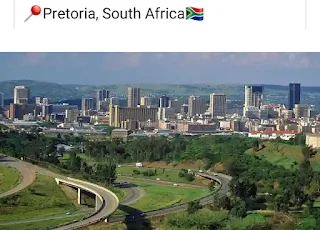14 things to expect when you travel to South Africa as a business man
 |
| South Africa |
Are you a business person living in the United States, Germany, United Kingdom or you are a south African who want to take a business trip to South Africa? then here are the the things to expect when you land in the country.
Traveling to South Africa as a businessman, you can expect a diverse and dynamic business environment. Here are some key things to anticipate to get you ready for effective an efficient decision making:
1. Visa Requirements:
Check the visa requirements for your nationality and ensure you have the necessary documentation to enter the country for business purposes.
This document will give you access to benefits that are attached with the business environments
2. Business Etiquette:
South Africans value personal relationships alot, so building trust and rappour with your business counterparts and partners is very important and essential. Punctuality and professionalism are also important when doing business in South Africa
3. Currency:
South Africa uses the South African Rand (ZAR). Familiarize yourself with the exchange rates and currency regulations. So that you will not be cheated or lose your investment opportunities that may give you high return in investment (ROI).
4. Safety:
While South Africa offers opportunities in business, it's important to be aware of safety concerns, especially in major cities like cape town and the capital city. Take precautions and follow local advice so as not to fall victim to bad people who their aim is to extort strangers.
5. Transportation:
Major cities like Johannesburg, Cape Town, and Durban have modern transportation infrastructure. Plan your travel within the country accordingly.
If possible book a particular driver that will be taken you around the cities as you embark on your business adventure, this will make your business trip more flexible and comfortable.
6. Accommodation:
South Africa has a range of accommodation options, from luxury hotels to more budget-friendly choices.
You can rent an apartment depending on the number of days or weeks you are to spend. Is even cheaper when you rent a local lodge so as to reduce cost in your business research or transactions.
7. Language:
English is widely spoken in the business community in the country, but South Africa is a multilingual country, so knowledge of other languages like Afrikaans or Zulu can be advantageous.
If you don't know how to speak any of those language you can hire a translator who will help you and make your conversations smooth and productive as you engage the business partners and investors.
8. Cultural Diversity:
South Africa is culturally diverse, so be prepared to work with people from various backgrounds. Understanding cultural nuances is important.
Package your self and be friendly to everyone you meet in the course of your business research or meetings.
9. Business Opportunities:
South Africa offers business opportunities in various sectors, including mining, finance, technology, entertainment and tourism. Research your industry and market thoroughly for better choice of investment.
10. Networking:
Attend business events, conferences, and networking functions to make connections and expand your business network with other business gurus.
11. Legal and Regulatory Environment:
Understand the local laws, regulations, and tax requirements related to your business activities in South Africa. If possible get your business registered with the right authorities so get all the benefits associated with a registered business in the country.
12. Health Precautions:
Check if vaccinations or health precautions are necessary for your trip. South Africa has regions with different health risks.
13. Internet and Communication:
Access to reliable internet and communication is generally available, but connectivity can vary in more remote areas.
14. Wildlife and Tourism:
South Africa is known for its stunning landscapes and wildlife. If time allows, consider exploring the country's natural beauty.
Remember to do thorough research and preparation before your trip to South Africa to ensure a successful and productive business visit.
What you need know about south Africa's economic and business policies
 |
| Cape town South Africa |
South Africa's economic and business policies have evolved over the years, and while I can provide you with information up to August 2023, it's important to note that policies may have changed since then. Here are some key points to know about South Africa's economic and business policies as of my last update:
Economic Overview:
South Africa is one of Africa's largest economies and is known for its diverse economy, with sectors including mining, manufacturing, agriculture, and services.
The country faces various economic challenges, including high unemployment, income inequality, and slow economic growth.
Economic Policies:
The South African government has traditionally followed a mixed economy approach, with a combination of free-market and state intervention policies.
Key government departments involved in economic policy include the National Treasury, the Department of Trade, Industry, and Competition, and the Department of Economic Development.
Black Economic Empowerment (BEE):
BEE is a policy aimed at redressing the inequalities of apartheid by promoting the participation of Black South Africans in the economy.
BEE policies include equity ownership, skills development, and preferential procurement for Black-owned businesses.
Investment Promotion:
South Africa has worked to attract foreign investment through incentives such as tax breaks, export promotion, and Special Economic Zones (SEZs).
The country has also implemented measures to improve the ease of doing business for new businessen who are planning to travel to South Africa.
Trade Policy:
South Africa is a member of the World Trade Organization (WTO) and has trade agreements with various countries and regional blocs, such as the Southern African Customs Union (SACU) and the Southern African Development Community (SADC).
Infrastructure Development:
Infrastructure development is a priority, with initiatives to upgrade transportation, energy, and telecommunications infrastructure to support economic growth.
Fiscal and Monetary Policy:
The South African Reserve Bank (SARB) manages monetary policy, while the National Treasury oversees fiscal policy.
Fiscal sustainability and managing public debt have been areas of concern.
Economic Challenges:
South Africa faces challenges like corruption, political instability, high unemployment, and structural issues that affect economic growth.
Please note that economic and business policies can change over time due to evolving circumstances and political leadership. For the most up-to-date information, it's advisable to consult official government sources and business news outlets.
This overviews on what to expect as a business man traveling to South Africa will help you make better business decisions for high return on investment.







0 Comments